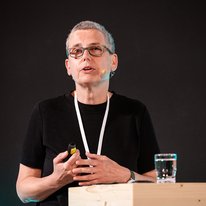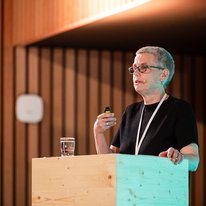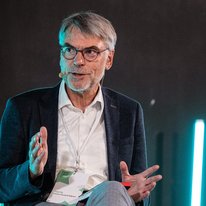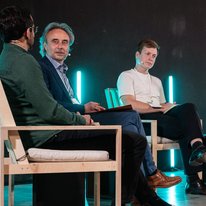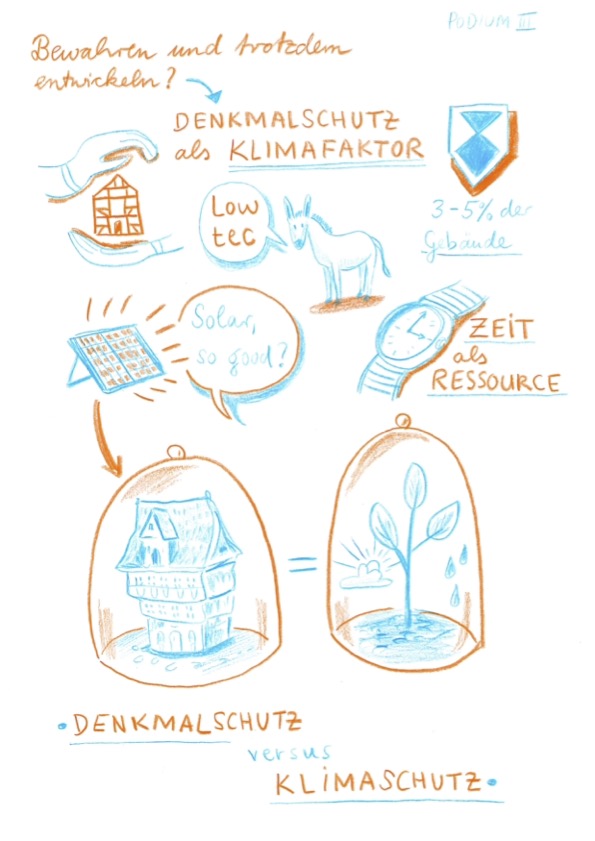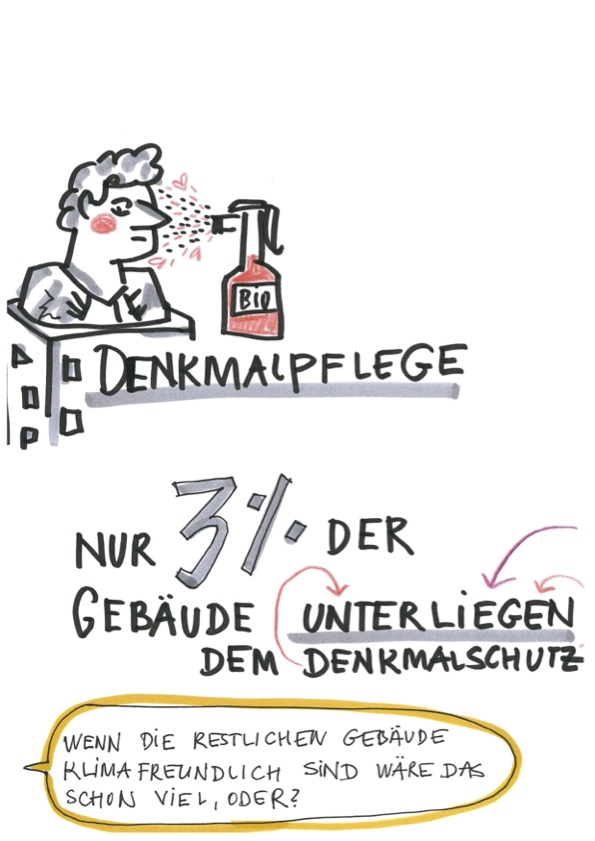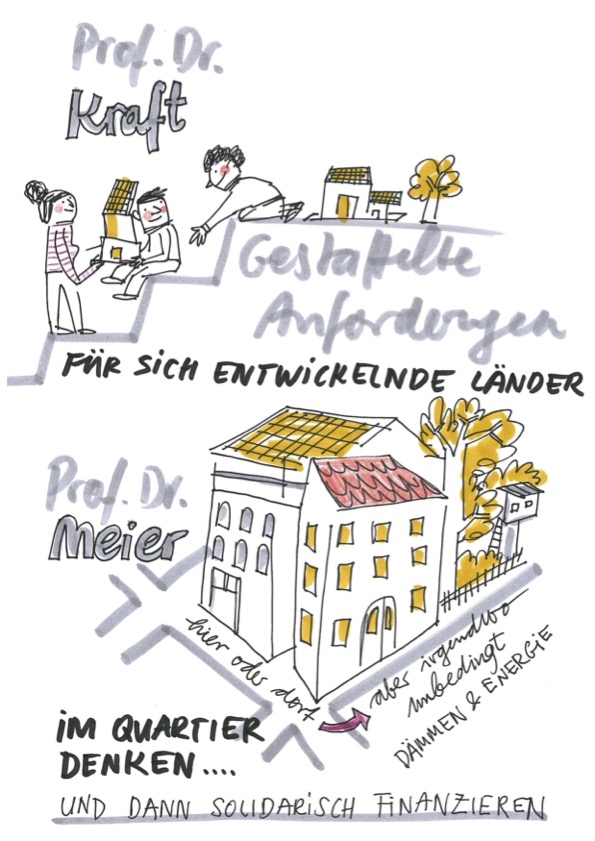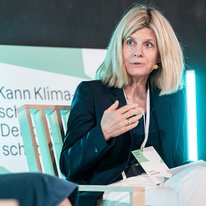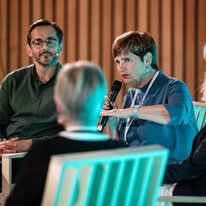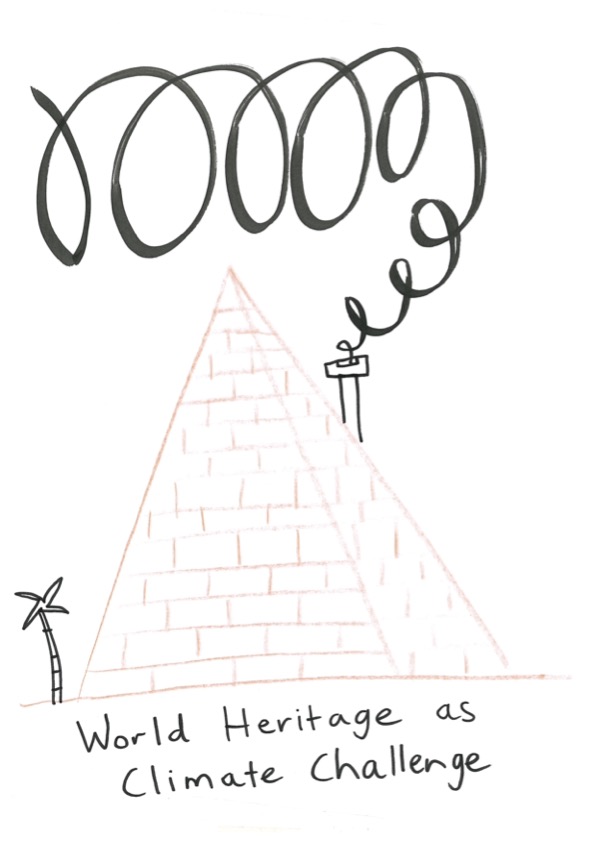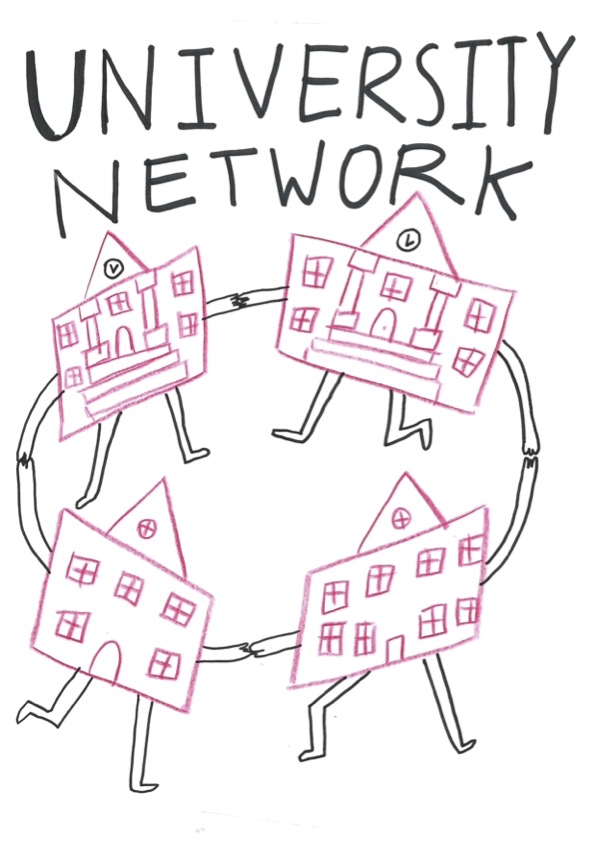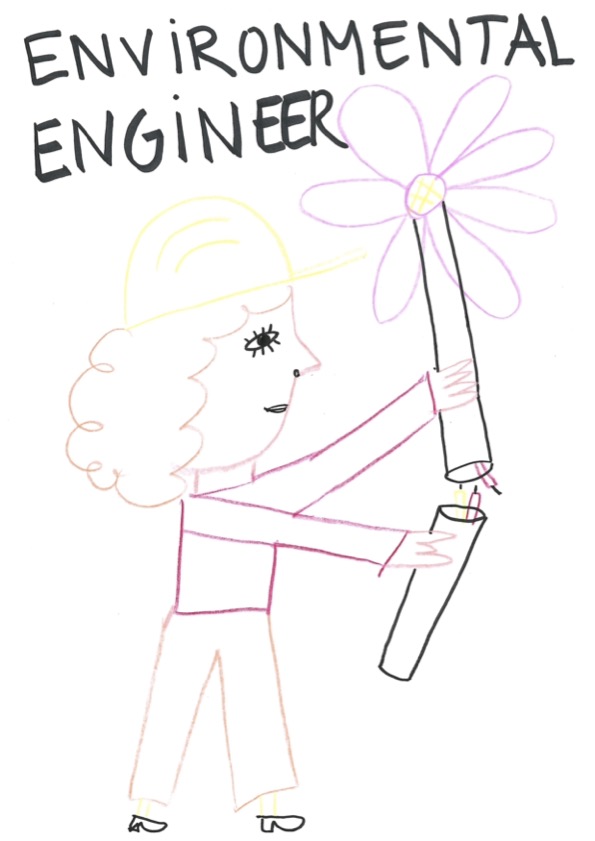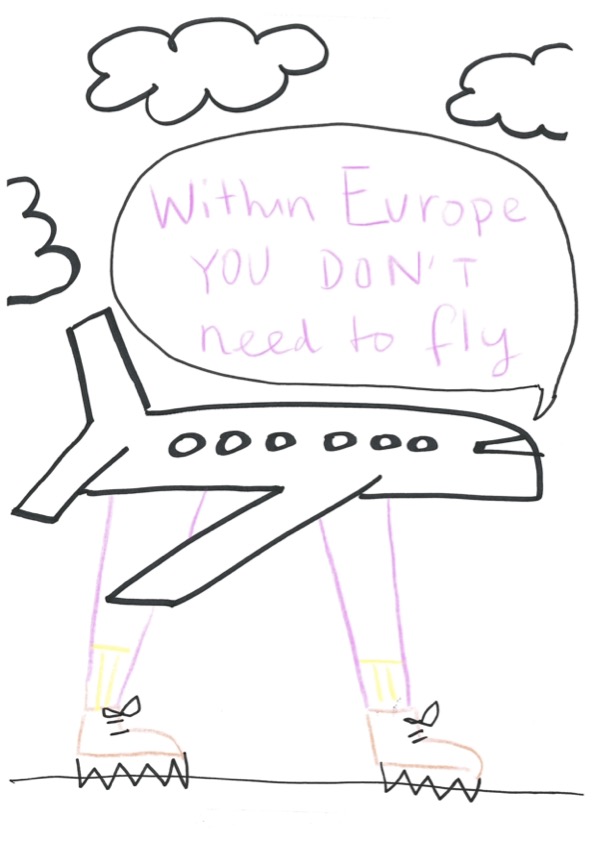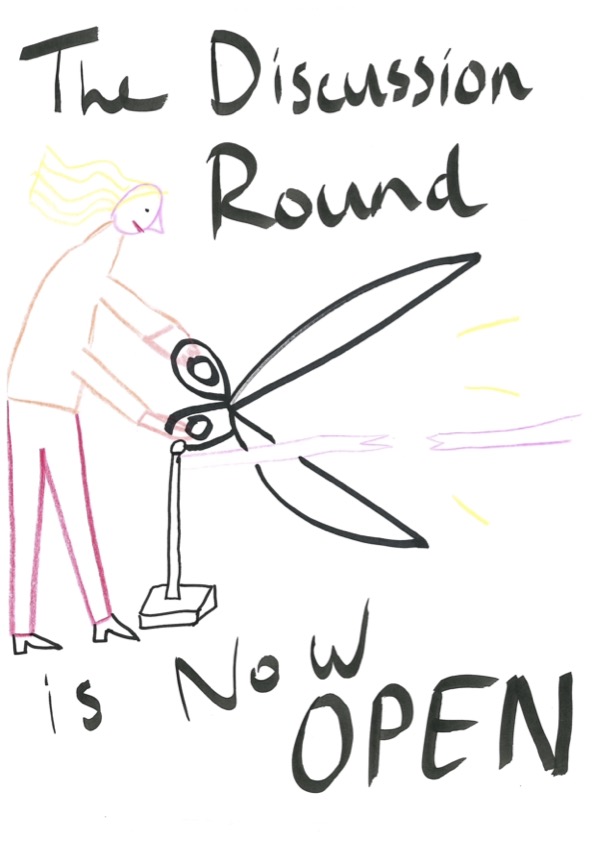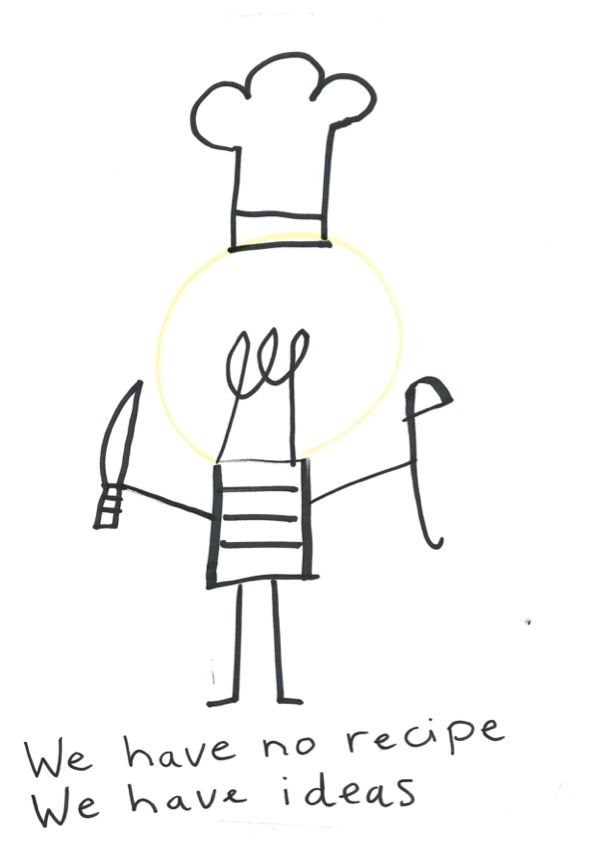«Spaceship Earth - repair advice for the crew»: this was the start of the Lab of ideas 2022after the welcoming speeches. Dr. Gregor Hagedorn, Academic Director of the Museum für Naturkunde Berlin and co-founder of Scientists for Future, demanded among others that the topic of climate change should make up 20 percent of teaching at universities in the future. He emphasized the importance of comparing the risks of maintaining the status quo with those of change - such as possible loss of prosperity. There is a need for a paradigm shift, for example, to only sell things that can be recycled or to replace oil heating systems with heat pumps instead of natural gas heating systems. was
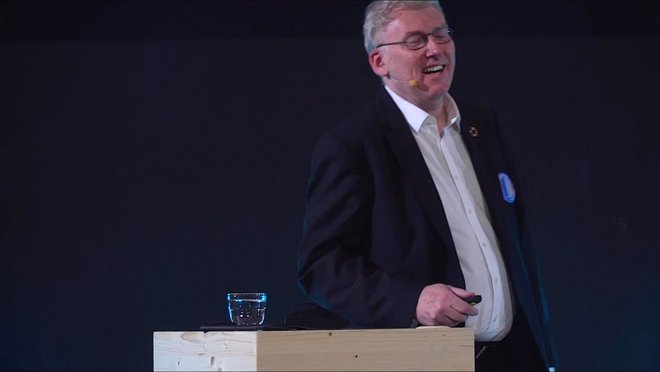
Raumschiff Erde – Reparaturtipps für die Besatzung
Click the Play button to load and view external content from Vimeo.com.
Automatically load and view external content from Vimeo.com (You can change this setting at any time via our »Data protection policy«.)
How can residential projects be created from a parking garage or an empty clinic? Examples that encourage unusual solutions were the focus of this panel discussion. Stephan Hempel presented the cooperative «Wohnprojekt Ro70 eG» - an intergenerational housing project in Weimar. Franziska Bernstein, Manager of the Alte Feuerwache Weimar, pointed out the challenges of this neighborhood project. Till Hoffmann, architect and staff at the Chair of Design and Housing at the Bauhaus-Universität Weimar, expanded the view to include Hamburg. Professor Dr. Anja Willmann, Bauhaus-University Weimar and Jade University of Applied Sciences, addressed, among other things, ideas for redesign the university campus in Weimar. was
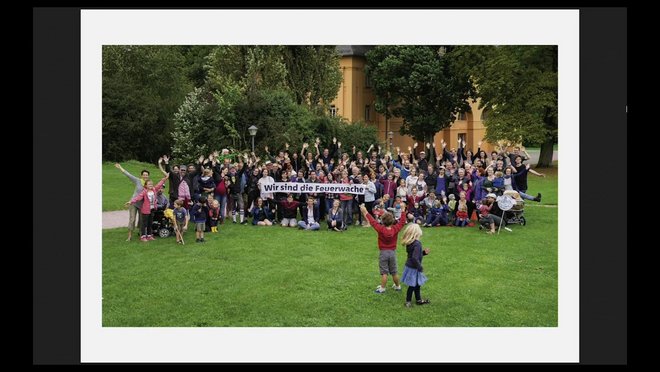
Nachhaltige Quartiersentwicklung: Erfolgsfaktoren und best practice, Podiumsdiskussion im Ideenlabor Bauhaus-Universität Weimar
Click the Play button to load and view external content from Vimeo.com.
Automatically load and view external content from Vimeo.com (You can change this setting at any time via our »Data protection policy«.)
In addition to Dr. Jasper Cepl, Professor for Theory and History of Modern Architecture and Martina Mellenthin Filardo from the working group «Equity» at the Bauhaus-Universität Weimar, Elke Duda, founder of of the «Women in Architecture" festival and David Petersen from the «Norbert Elias Center for Transformation Design & Research» discussed equitable urban development in public space. Aspects such as gender, age, mobility, socio-economic backgrounds and social roles in the various living spaces, were the focus of the discussion. Using «gender planning» strategies they need to be adapted to the needs of the people who live in them. Lud
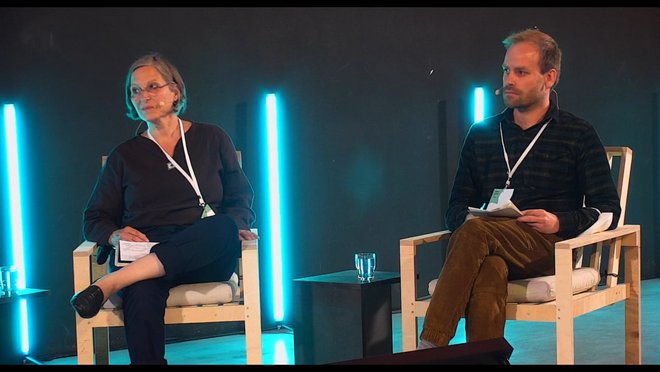
Diversität und Inklusion als Innovationstreiber, Podiumsdiskussion beim Ideenlabor der Bauhaus-Universität Weimar
Click the Play button to load and view external content from Vimeo.com.
Automatically load and view external content from Vimeo.com (You can change this setting at any time via our »Data protection policy«.)
Panel of experts: sustainable regional development
The aim of the round table was to take a close look at the challenges of different European regions and to seek for synergies or common topics to pursue and deepen the cooperation on the New European Bauhaus (NEB). Staying in line with the NEB-initiative, the discussion focused on the challenges within the following thematic areas:
- Climate & Environment (challenges and risks, climate neutral and resilient development).
- Economic and territorial development (sustainable use of territorial resources, regional value chains and circular economy models).
- Social and demographic development (services of general interest, segregation, migration)
- Infrastructure & heritage (use, maintenance and transformation of existing infrastructure, heritage as a material and cultural resource).
Finally, the results were summarised and different formats for future cooperation were discussed.
ts
Participants
List of Participants:
- Haut-de-France: Romain Nivelle (Director of the Mission to the EU at Région Hauts-de-France), Emmanuelle Le Jeune (Expert in charge of Culture, Education, Training, Citizenship and Youth at the Mission to the European Union of the Hauts-de-France Region), Morgane Vandernotte (Regional Council at Région Hauts-de-France, in charge of partnerships with Poland), Céline Rohart (Deputy Director of European and international office, Amiens Métropole)
- Siena: Miriam Grottanelli de Santi (Director of the Siena Art Institute – Community Hub fostering artistic excellence while developing cultural awareness and social responsibility)
- Thuringia: Kerstin Faber (Project Manager at IBA-Thüringen – Specialised in the development of new spatial identities and participative design processes)
- University of Bergamo: Elena Gotti (Staff manager and International Coordinator)
- Bauhaus-Universität Weimar: Prof. Dr. Sigrun Langner (Professor in Landscape Architecture and Planning), Dr. Christian Kästner (Head of Department International Office), Eva Léchelle (Referent for the Development of European Partner Network), Dr. Tonia Schmitz (Environmental Engineer, Co-author of the BUW-proposal for the NEB Initiative)
How reasonable is it to continue constructing new buildings given the fact of climate change? Susanne Wartzeck, President of the Bund Deutscher Architekten, gave an inspiring keynote speech. In order to find solutions for scarce resources and affordable housing, it is important to develop the existing building stock - together with the neighborhoods and their residents. There should be no taboos, instead a different aesthetic is needed to dedicate existing buildings to new uses. was
![[Translate to English:] (c) Mike Klar](/fileadmin/user/uni/universitaetsleitung/rektor/Europaeisches_Bauhaus/Ideenlabor_2022/scan20220613152358_014_Keynot_II.jpg)
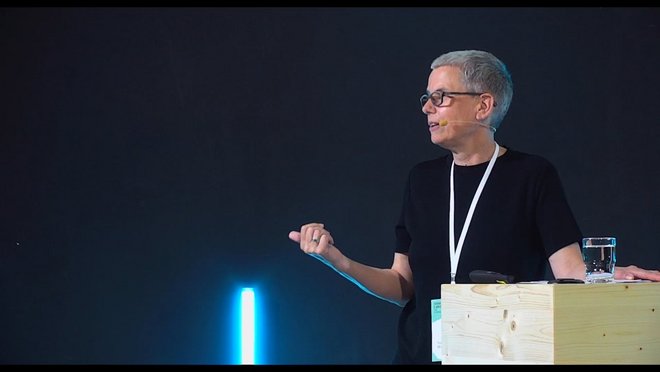
Welche Chancen stecken in der Ressource Bestand?
Click the Play button to load and view external content from Vimeo.com.
Automatically load and view external content from Vimeo.com (You can change this setting at any time via our »Data protection policy«.)
Many people do not initially associate the protection of historical monuments with climate protection. But what opportunities do historic buildings offer? Are solar systems allowed to be installed on World Heritage buildings and where is this already happening in Weimar? Susanne Dieckmann, Klassik Stiftung Weimar, Prof. Hans-Rudolf Meier, Heritage Center of the Bauhaus-Universität Weimar, Florian Dossin, Bauhaus-Universität and co-founder of the Institut für Graue Energie and Prof. Eckhardt Kraft, Chair of Biotechnology in Resource Management at the Bauhaus-Universität, discussed these questions. They agreed that monuments should be considered holistically. In addition to energy, their cultural and design value has to be considered. Also, new or renovated buildings could compensate for their energy gaps. Sometimes, solar systems can even usefully complement monuments, as in the Museum Neues Weimar. was
Free spaces for thinking, designing, networking - these wishes were the focus of the final discussion. As the Lab of Ideas event shows, there is a need for regular dialogue between research, civil society, creative people and many more, concluded Prof. Jutta Emes, interim president of the Bauhaus-Universität Weimar, Dr. Ulrike Lorenz, president of the Klassik Stiftung Weimar, Dr. Marta Doehler-Behzadi, managing director of the Internationale Bauausstellung Thüringen and Dr. Claudia Kolb, Weimar city councilor for building and urban development. was


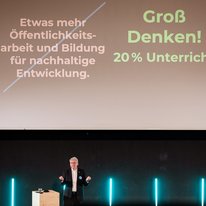
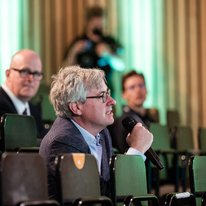

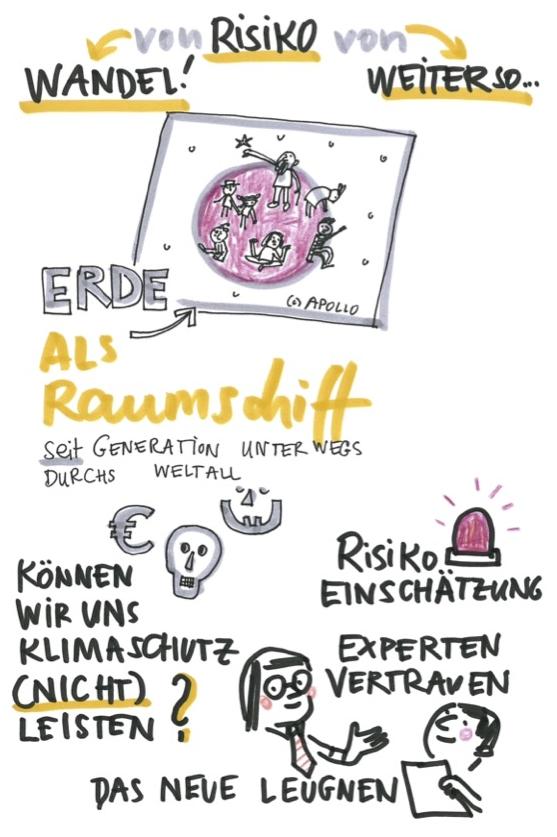
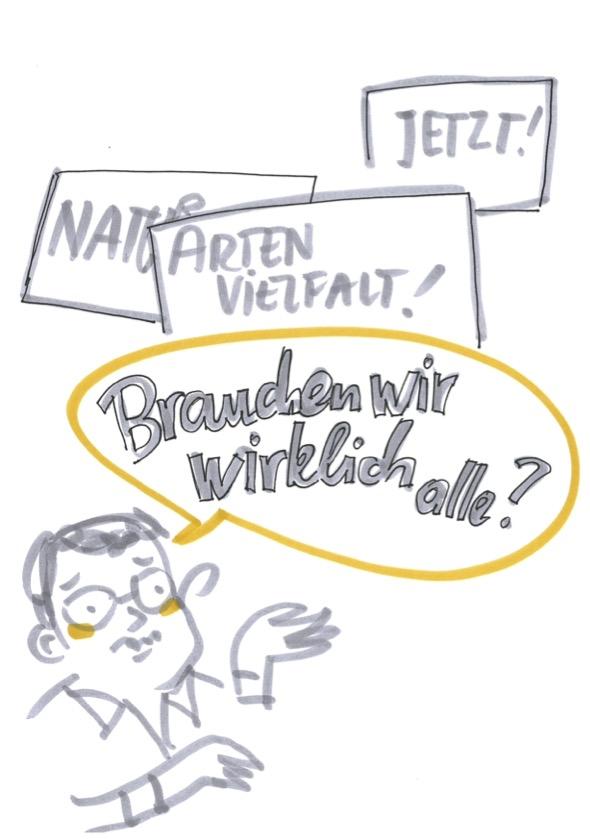
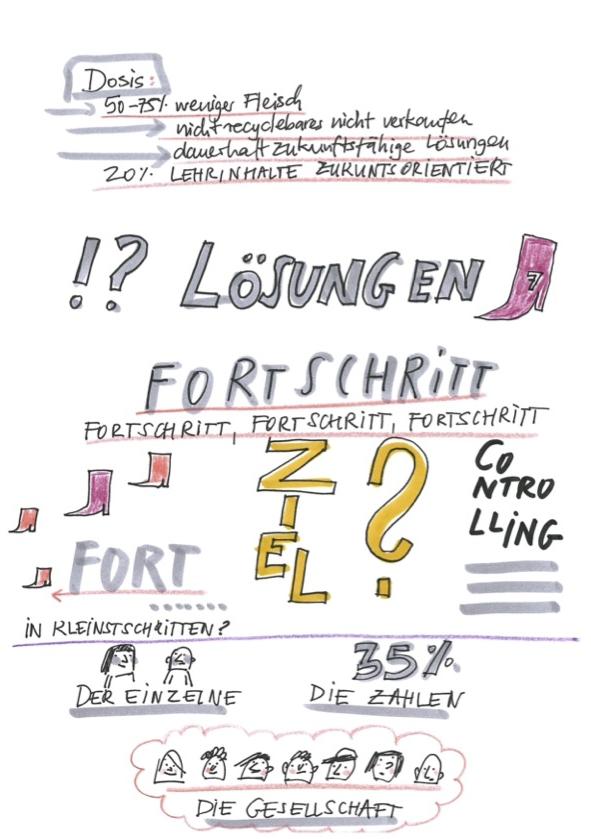

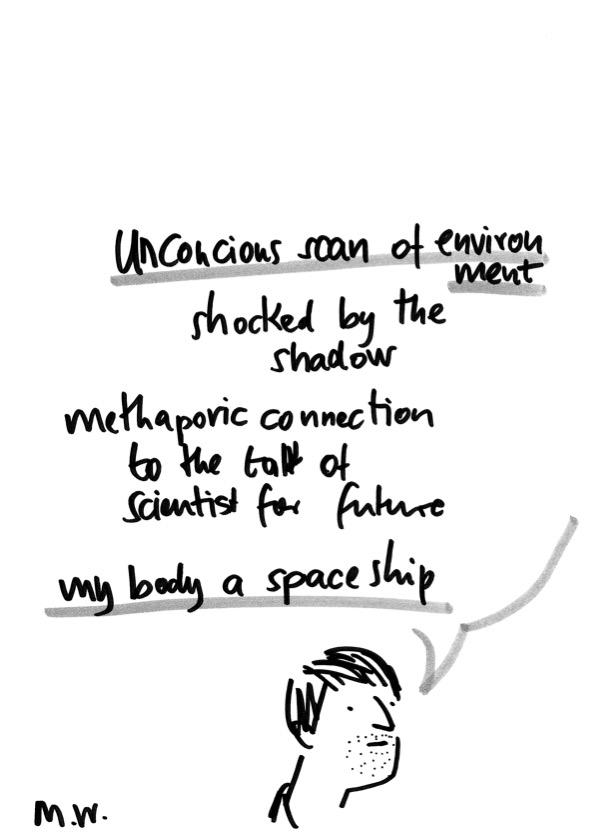
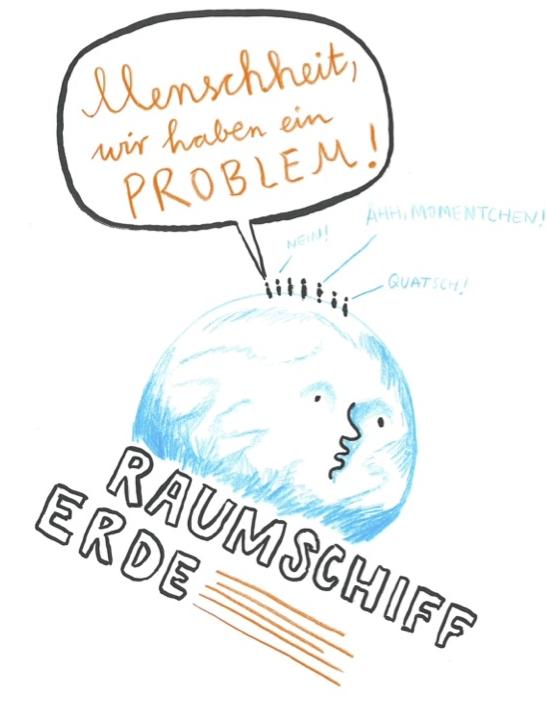

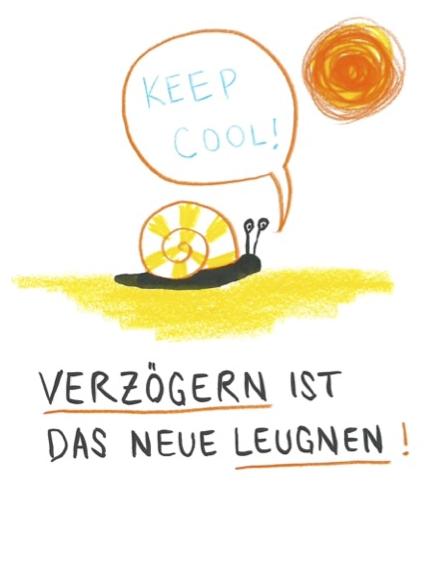



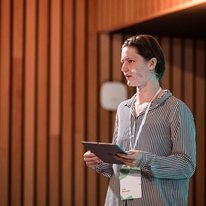




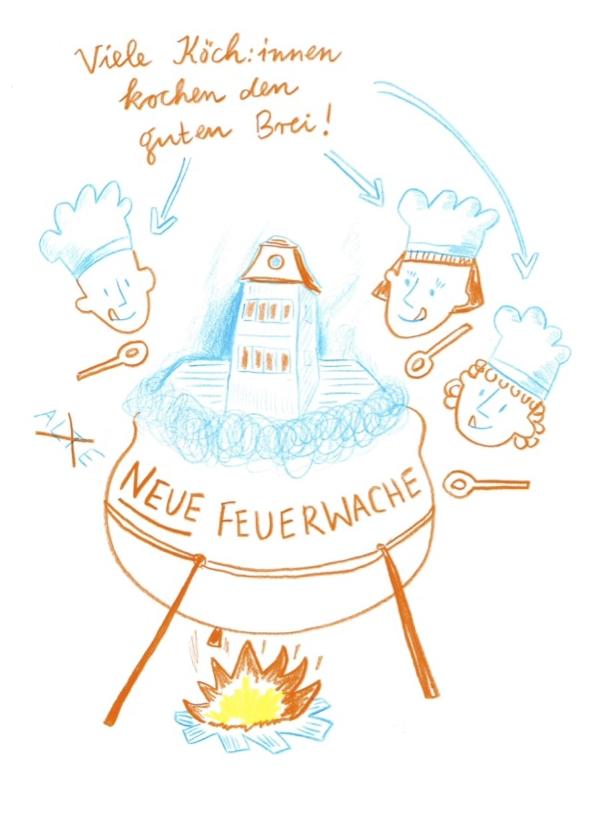
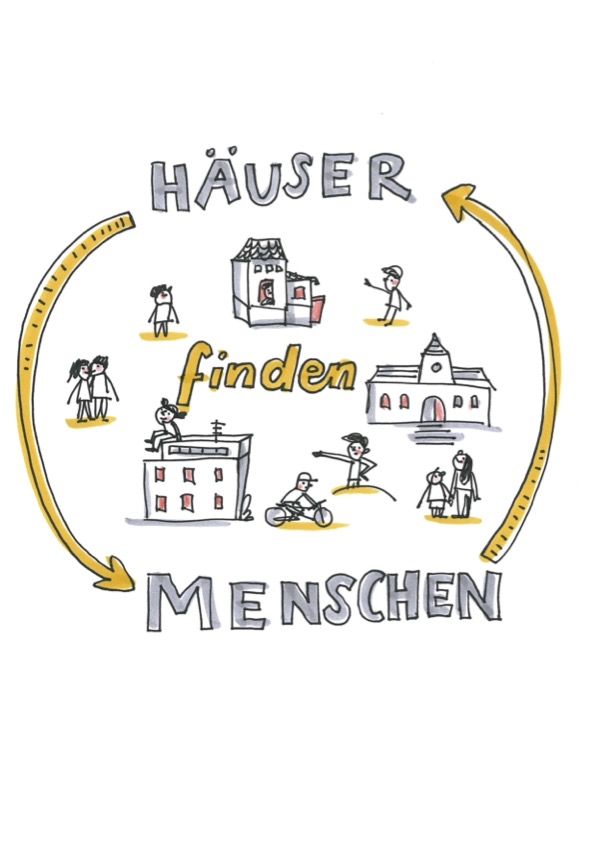
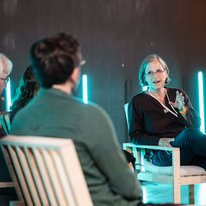



![[Translate to English:] (c) Mike Klar](/fileadmin/user/uni/universitaetsleitung/rektor/Europaeisches_Bauhaus/Ideenlabor_2022/scan20220613152358_010_Podium_II.jpg)
![[Translate to English:] (c) Mike Klar](/fileadmin/user/uni/universitaetsleitung/rektor/Europaeisches_Bauhaus/Ideenlabor_2022/scan20220613152358_011_Podium_II.jpg)
![[Translate to English:] (c) Mike Klar](/fileadmin/user/uni/universitaetsleitung/rektor/Europaeisches_Bauhaus/Ideenlabor_2022/scan20220613152358_012_Podium_II.jpg)
![[Translate to English:] (c) Mike Klar](/fileadmin/user/uni/universitaetsleitung/rektor/Europaeisches_Bauhaus/Ideenlabor_2022/scan20220613152358_013_Podium_II.jpg)
![[Translate to English:] (c) Mike Klar](/fileadmin/user/uni/universitaetsleitung/rektor/Europaeisches_Bauhaus/Ideenlabor_2022/scan20220613152358_017_Podium_II.jpg)
![[Translate to English:] (c) Verena Herbst](/fileadmin/user/uni/universitaetsleitung/rektor/Europaeisches_Bauhaus/Ideenlabor_2022/scan20220613154129_003_Epertenrunde.jpg)
![[Translate to English:] (c) Verena Herbst](/fileadmin/user/uni/universitaetsleitung/rektor/Europaeisches_Bauhaus/Ideenlabor_2022/scan20220613154129_004_Epertenrunde.jpg)
![[Translate to English:] (c) Verena Herbst](/fileadmin/user/uni/universitaetsleitung/rektor/Europaeisches_Bauhaus/Ideenlabor_2022/scan20220613154129_005_Epertenrunde.jpg)
![[Translate to English:] (c) Verena Herbst](/fileadmin/user/uni/universitaetsleitung/rektor/Europaeisches_Bauhaus/Ideenlabor_2022/scan20220613154129_006_Epertenrunde.jpg)

